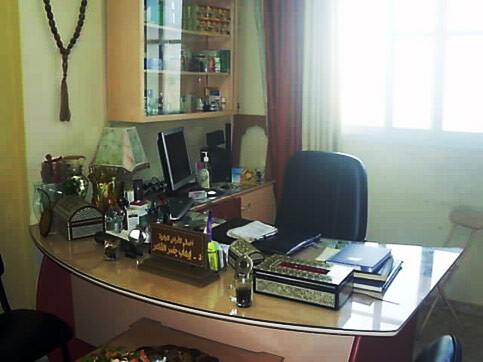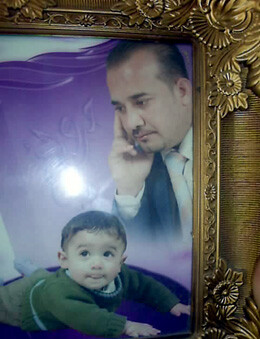Gaza Strip 8 January 2009

The now empty office of Dr. Ehab al-Shaer, killed on 27 December in an Israeli air strike.
Dr. Ehab Jasir al-Shaer, a physician specializing in dermatology, a graduate of a university in Ukraine, has not been at his clinic since 27 December 2008.
On that day, Ehab, his brother Raja, Ehab’s uncle Yasir and Ehab’s cousins Haitham and Tamer, all went to the Rafah governorate local administration building in Rafah City in the south of the Gaza Strip where they live.
“At 10:00am, my sons, my brother and my nephews went to the governorate. Suddenly at almost 11:30am, we heard loud explosions everywhere,” said Jasir al-Shaer, Dr. Ehab’s 60-year-old father, while sitting on a sofa at Ehab’s clinic.
“Neighbors told us that the governorate building was just hit by Israeli warplanes. My heart began beating very quickly. I left my home and rushed over. Among the dead bodies I found my son Ehab, my brother Yasir and his son Haitham laying lifeless in the hospital’s morgue,” Jasir said with a clear voice.
“Ehab’s smile never left him at any moment. He was a cheerful, kind and caring husband. That’s all I have ever known from Ehab since we married three years ago,” Nancy Jouda, Dr. Ehab’s wife, recalled with tears in her eyes.
“What mostly grieves me,” says Nancy who is pregnant, “is that my baby will never see his father.” Now a widow at 28 she is also the mother of a little boy and girl who have just lost their father.

A detail of a photo of Dr. Ehab al-Shaer and his young son.
The family of Jasir al-Shaer became refugees in 1948 when they were forced out of their village of Karatiya, one of 450 towns in what is now called Israel whose inhabitants were displaced. The family lost two other sons in May 2004 when the Israeli army attacked their neighborhood of Tal al-Sultan to the west of Rafah City.
Patients are shocked at their doctor’s sudden death. “I phoned Dr. Ehab to confirm an appointment, but the person on the end of the phone was not Ehab, it was his brother,” recalls Shirin, one of Ehab’s patients who did not give her full name. “I almost fainted, crying nonstop.”
Dr. Ehab al-Shaer first opened a clinic in downtown Rafah in 2006 and established a respected dermatology practice. A year later, as his reputation spread, he opened a branch of his clinic in Nuseirat refugee camp in the central Gaza Strip.
“We used to receive many patients during working hours at this clinic,” said Khawla Elian, the clinic’s administrator. He sometimes conducted minor cosmetic surgeries at the clinic and kept fees for treatment of ailments low. “Dr. Ehab, may he rest in peace, was a very professional doctor. I often wondered at the fact that people from all over Gaza came to his clinic.”
“What a loss,” Khawla says as she and Ehab’s father Jasir take stock of what has happened. Now at the clinic the silence is overwhelming. No more patients, no more surgeries, no more prescriptions, and no more of Dr. Ehab al-Shaer’s smile.
How many more will be lost like Dr. Ehab? As I write this story Israeli warplanes, including American-made F-16 jet fighters and drones, are dropping bombs on my town as they have been for the past few hours, wounding so far five people. The injured may be neighbors of mine, I don’t know. Is this really a war against Hamas or is it a war against the people?
All photos copyright Rami Almeghari.
Rami Almeghari is contributor to The Electronic Intifada, IMEMC.org and Free Speech Radio News and is a part-time lecturer on media and political translation at the Islamic University of Gaza. Rami is also a former senior English translator at and editor-in-chief of the international press center of the Gaza-based Palestinian Information Service. He can be contacted at rami_almeghari A T hotmail D O T com.
Related Links





